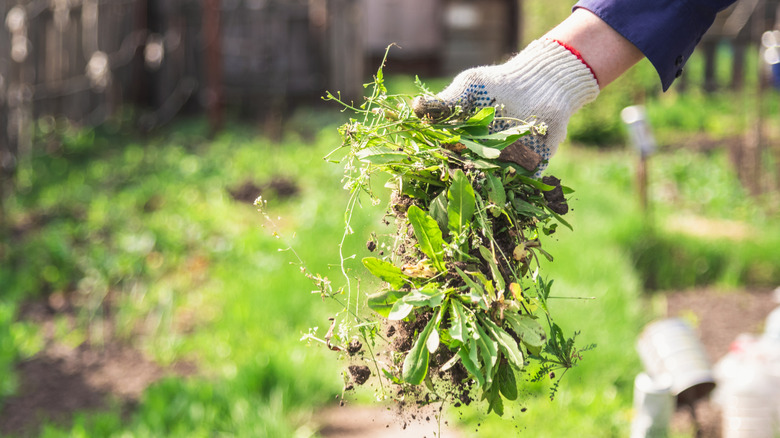How To Mix Bleach Or Vinegar And Water To Kill Weeds
If you're an organic gardener, you're probably considering homemade solutions rather than synthetic chemicals to control weeds, although it's important to note that homemade products that may kill weeds are also chemical compounds. Both bleach and vinegar are effective herbicides, but not necessarily when mixed with water. In fact, you should use them undiluted if you want them to work. Use them separately; mixing any household chemicals or substances together is unadvised. Even used alone, they do pose hazards and need to be applied judiciously and with care.
Neither vinegar nor bleach is a good option for widespread weed control. They work best when targeting individual weeds in specific locations, because they'll kill the top growth of any plant they touch, and their use can impact not only soil pH but also can kill beneficial soil organisms. Another downside is that these two products generally don't kill persistent roots, so they're not a permanent solution.
Vinegar as an Herbicide
Horticultural experts recognize that vinegar is a viable weed killing agent, but it must be a stronger grade than that available in your local market. Household vinegar typical in store-bought salad dressings and pickles contains about 5% acetic acid, the active ingredient. This amount of acetic acid can irritate your skin and eyes, but acetic acid is considered safe up to 8%, according to the U.S. Environmental Protection Agency (EPA).
You'll need horticultural-strength vinegar containing about 11% acetic acid to kill weeds effectively. This level of acetic acid must be registered with the EPA because it poses a real danger — resulting in possible permanent eye damage or skin burns if you come into contact with it. In addition, high concentrations of acetic acid can alter the soil's pH, making it more acidic. For example, a 20% acetic acid solution has been known to lower soil pH for at least a month.
Treat horticultural-grade vinegar as the herbicide it is: Wear gloves and eye guards when applying it. Use it at full strength to maximize effectiveness. Apply it specifically to the weeds you want to kill, since it will damage or kill every plant it touches. Studies have shown that it is most effective on broadleaf weeds and on young weeds; those with taproots usually come back after vinegar treatment.
Bleach for Weed Killing
The first thing to know about using bleach to kill weeds is that it will harm the soil by making it overly salty so that nothing will grow there until the bleach flushes out. There is no clear data on how long this takes — possibly because no horticultural experts recommend using bleach to kill weeds.
Further, it may seep into the groundwater. It will kill helpful bacteria and organisms in your soil. In fact, there are multiple reasons bleach is not a good idea for weed control.
The only application in which bleach might make sense is in the cracks between patio or walkway pavers in which weeds are growing, that is, locations where you know you don't plan to nurture living plants of any kind. If you choose to use it, apply it on a calm day to prevent accidentally spraying it in other areas. Wear gloves and eye protection, and make sure any children or pets avoid the area during the spraying and for several hours afterward.
Other Natural Herbicide Options
In addition to herbicidal vinegar, there are several other non-chemical alternatives you can try for weed control. Corn gluten meal, for instance, may suppress seed germination. Because it also keeps desirable seeds from germinating, you should sprinkle it in an already-established garden. Salt is another option, but, like bleach, will make the soil uninhabitable for several months.
Other options include using weed torches, which burn weeds, and pouring boiling water over weeds. These methods require several applications, but might be worth it to avoid the use of chemicals. And, don't forget to mulch. Mulching, whether with natural bark, wood chips or just plain old newspaper, is your first defense against unwanted invaders.
